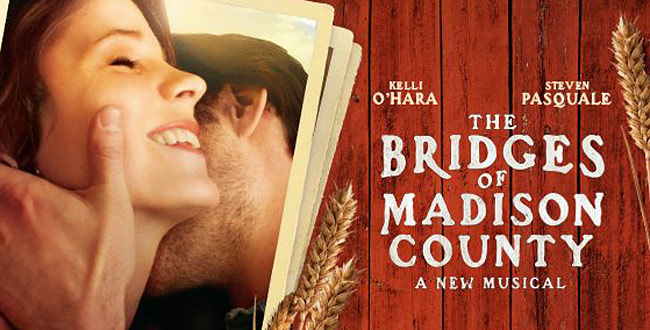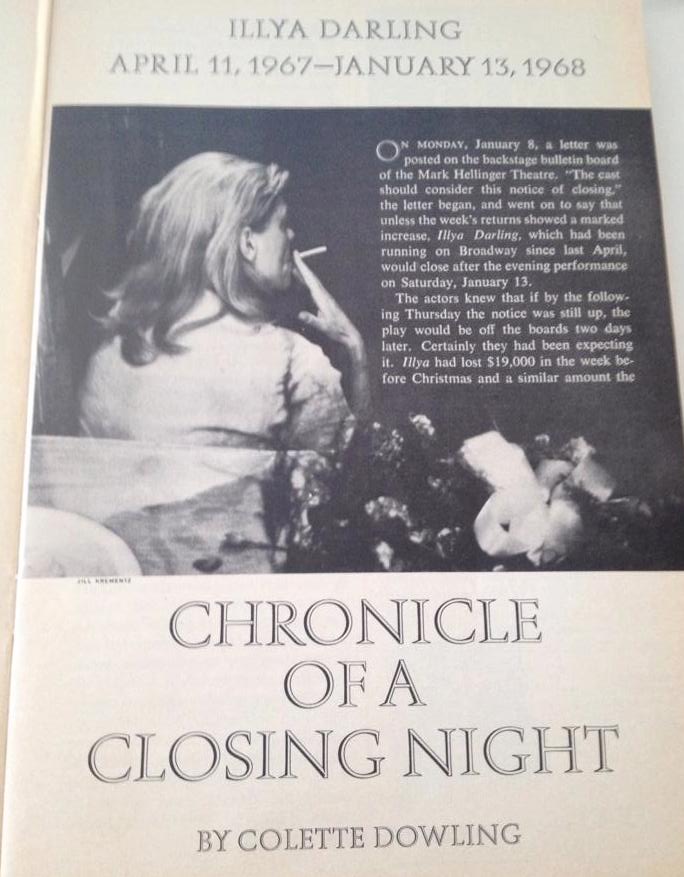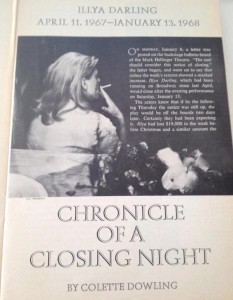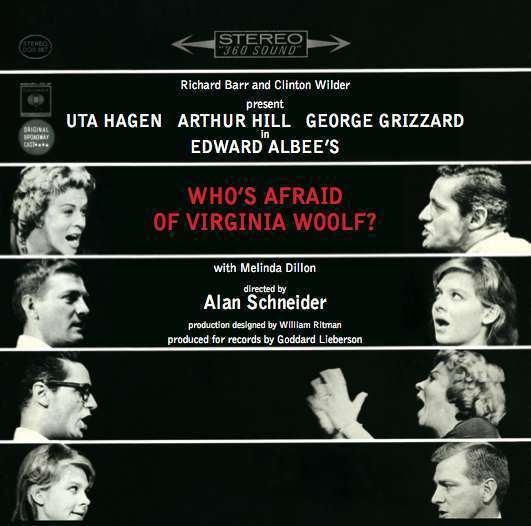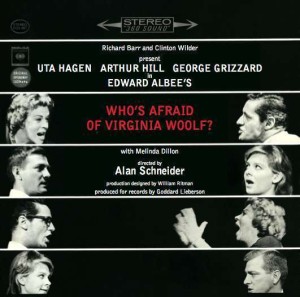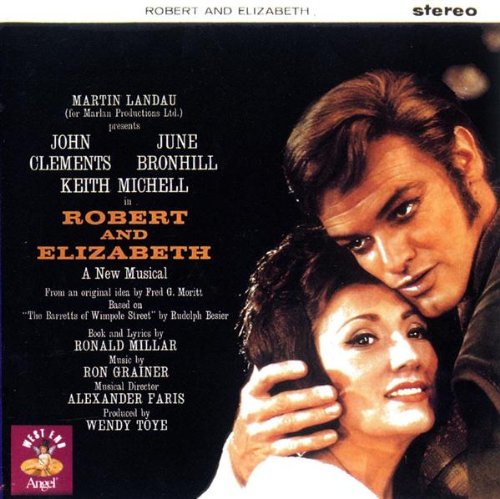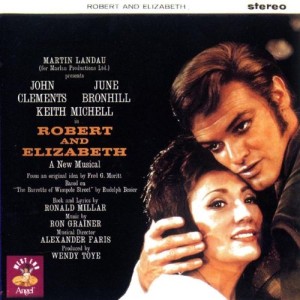It’s Tony Awards time, yet again. The last month has been spent praising the nominees, cursing the nominating committee for what it got wrong (namely, The Bridges of Madison County) and filling out our personal ballots and surveys. We’ve also been subjected to polls, videos, luncheons, speeches, think-pieces, as well as the Outer Critics Circle and Drama Desk Awards, which all point the way toward “Broadway’s biggest night” tomorrow evening on CBS.
The race for Best Play seems to be nonexistent; it’s wide open with an edge to either All the Way or Act One, but no one seems to have great love for any of the five nominees. Best Musical has been met with some controversy this year, as only one book musical with an original score has been nominated. The other three new musicals are a revue, a jukebox musical and another Disney film-to-stage adaptation. Part of the controversy was the gaffe over the new fifth nominee rule. As per the voting guidelines a fifth nominee wasn’t necessary but confusion proved somewhat embarrassing. If they want to make it possible to expand the number of nominees, they should just expand the number of nominees and be done with it.
My mantra remains the same: awards are weird. Yes, they are wonderful for whomever is lucky enough to be voted the winner. Plus, it has been shown that Tony wins can have a financial impact. However, the outcome does not discount the fact that there are some truly wonderful performances that haven’t been honored. When a person doesn’t win a Tony Award, it doesn’t discount his or her achievement. Furthermore, a Tony win or loss doesn’t validate or invalidate the experience of an audience member.
There are many factors which can effect the voting. There can be a tendency to overlook fall shows, which have closed or lost momentum. Sometimes there is category fraud, where a performance is nominated in the wrong category, such as a featured performance being nominated as lead and vice versa (ask Patti LuPone about losing for Anything Goes or see Rita Moreno’s Tony acceptance speech). Sometimes it’s a real nail-biter, such as Ethel Merman in the successful Gypsy losing to Mary Martin in the SRO smash hit The Sound of Music. In some instances co-stars are nominated opposite against each other, like Dorothy Collins and Alexis Smith in the original Follies. Whatever the case, it is interesting to go back and see how voters voted over the years.
Following up on last year’s post about Tony-losing plays and musicals, here’s a select list of major leading contenders – some iconic – that were not Tony winners. The winner(s) are in parentheses.
BEST ACTRESS IN A MUSICAL
1956-57: Julie Andrews, My Fair Lady (Judy Holliday, Bells Are Ringing)
1959-60: Ethel Merman, Gypsy (Mary Martin, The Sound of Music)
1963-64: Barbra Streisand, Funny Girl (Carol Channing, Hello, Dolly!)
1965-66: Gwen Verdon, Sweet Charity (Angela Lansbury, Mame)
1971-72: Dorothy Collins, Follies (Alexis Smith, Follies)
1975-76: Chita Rivera & Gwen Verdon, Chicago (Donna McKechnie, A Chorus Line)
1983-84: Bernadette Peters, Sunday in the Park with George (Chita Rivera, The Rink)
1987-88: Patti LuPone, Anything Goes (Joanna Gleason, Into the Woods)
1997-98: Marin Mazzie, Ragtime (Natasha Richardson, Cabaret)
1998-99: Carolee Carmello, Parade (Bernadette Peters, Annie Get Your Gun)
2002-03: Bernadette Peters, Gypsy (Marissa Jaret Winokur, Hairspray)
2003-04: Donna Murphy, Wonderful Town & Tonya Pinkins, Caroline, or Change (Idina Menzel, Wicked)
2011-12: Jan Maxwell, Follies (Audra McDonald, Porgy and Bess)
BEST ACTRESS IN A PLAY
1954-55: Barbara Bel Geddes, Cat on a Hot Tin Roof (Julie Harris, The Lark)
1956-57: Rosalind Russell, Auntie Mame (Margaret Leighton, Separate Tables)
1959-60: Claudia McNeil, A Raisin in the Sun & Geraldine Page, Sweet Bird of Youth (Anne Bancroft, The Miracle Worker)
1974-75: Elizabeth Ashley, Cat on a Hot Tin Roof (Ellen Burstyn, Same Time, Next Year)
1975-76: Tovah Feldshuh, Yentl (Irene Worth, Sweet Bird of Youth)
1981-82: Geraldine Page, Agnes of God (Zoe Caldwell, Medea)
2004-05: Kathleen Turner, Who’s Afraid of Virginia Woolf? (Cherry Jones, Doubt)
2007-08: Amy Morton, August: Osage County (Deanna Dunagan, August: Osage County)
2008-09: Janet McTeer & Harriet Walter, Mary Stuart (Marcia Gay Harden, God of Carnage)
BEST ACTOR IN A MUSICAL
1956-57: Robert Weede, The Most Happy Fella (Rex Harrison, My Fair Lady)
1975-76: Jerry Orbach, Chicago (George Rose, My Fair Lady)
1981-82: Raul Julia, Nine (Ben Harney, Dreamgirls)
1983-84: Mandy Patinkin, Sunday in the Park With George (George Hearn, La Cage Aux Folles)
1986-87: Colm Wilkinson, Les Miserables (Robert Lindsay, Me and My Girl)
1991-92: Nathan Lane, Guys and Dolls (Gregory Hines, Jelly’s Last Jam)
1997-98: Brian Stokes Mitchell, Ragtime (Alan Cumming, Cabaret)
2000-01: Matthew Broderick, The Producers (Nathan Lane, The Producers)
2005-06: Michael Cerveris, Sweeney Todd (John Lloyd Young, Jersey Boys)
2006-07: Raul Esparza, Company (David Hyde Pierce, Curtains)
2012-13: Bertie Carvel, Matilda (Billy Porter, Kinky Boots)
BEST ACTOR IN A PLAY
1957-58: Laurence Olivier, The Entertainer (Ralph Bellamy, Sunrise at Campobello)
1959-60: Sidney Poitier, A Raisin in the Sun (Melvyn Douglas, The Best Man)
1963-64: Richard Burton, Hamlet (Alec Guinness, Dylan)
1973-74: Jason Robards, A Moon for the Misbegotten (Michael Moriarty, Find Your Way Home)
1974-75: Peter Firth – Equus (John Kani & Winston Ntshona, Sizwe Banzi is Dead/The Island)
1998-99: Kevin Spacey, The Iceman Cometh (Brian Dennehy, Death of a Salesman)
2004-05: Brían F. O’Byrne, Doubt (Bill Irwin, Who’s Afraid of Virginia Woolf?)
2010-11: Joe Mantello, The Normal Heart (Mark Rylance, Jerusalem)
